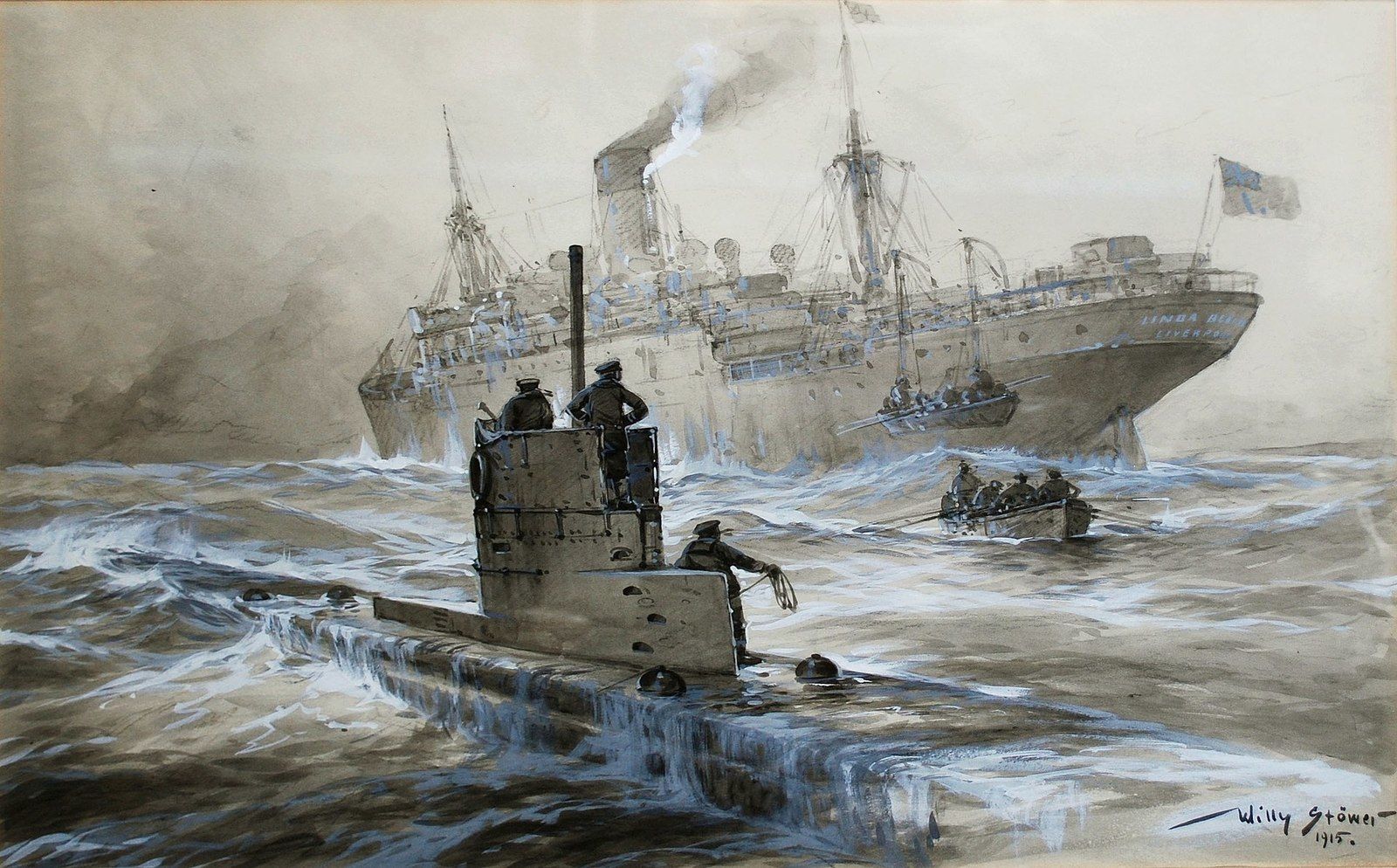209: Turning the Tide: 1of4: How a Small Band of Allied Sailors Defeated the U-boats and Won the Battle of the Atlantic 1st Edition. by Ed Offley (Author)

(Photo:Sinking of the Linda Blanche out of Liverpool by SM U-21 (https://en.wikipedia.org/wiki/SM_U-21_(Germany)) (Willy Stöwer (https://en.wikipedia.org/wiki/Willy_St%C3%B6wer) ) Willy Stöwer (1864–1931) - http://www.cityofart.net/bship/u_boat_gallery.html Sinking of the Linda Blanche out of Liverpool (German: Kaperung und Versenkung des englischen Handelsdampfer Linda Blanche):[1] (https://en.wikipedia.org/wiki/U-boat#cite_note-History-info.de-1) a German depiction of the attack of a U-boat on the Linda Blancheduring WWI, showing the disembarkation of passengers from the stricken vessel - a procedure not always done in practice. The Linda Blanche was sunk on 30 January 1915 by U-21 (https://en.wikipedia.org/wiki/SM_U-21_(Germany)) , under the command of Kapitän-Leutnant Hersing.[1] (https://en.wikipedia.org/wiki/U-boat#cite_note-History-info.de-1) Permission details This is a faithful photographic reproduction of a two-dimensional, public domain (https://commons.wikimedia.org/wiki/Public_domain) work of art. The work of art itself is in the public domain for the following reason: The author died in 1931, so this work is in the public domain (https://en.wikipedia.org/wiki/public_domain) in its country of origin and other countries and areas where the copyright term (https://en.wikipedia.org/wiki/List_of_countries%27_copyright_lengths) is the author's life plus 80 years or fewer. This work is in the public domain (https://en.wikipedia.org/wiki/public_domain) in the United States (https://en.wikipedia.org/wiki/United_States) because it was published (https://commons.wikimedia.org/wiki/Commons:Publication) (or registered with the U.S. Copyright Office (https://en.wikipedia.org/wiki/United_States_Copyright_Office) ) before January 1, 1925. This file has been identified as being free of known restrictions under copyright law, including all related and neighboring rights. (https://creativecommons.org/publicdomain/mark/1.0/deed.en) The official position taken by the Wikimedia Foundation is that "faithful reproductions of two-dimensional public domain works of art are public domain". This photographic reproduction is therefore also considered to be in the public domain in the United States. In other jurisdictions, re-use of this content may be restricted; see Reuse of PD-Art photographs (https://commons.wikimedia.org/wiki/Commons:Reuse_of_PD-Art_photographs) for details.View more (https://en.wikipedia.org/wiki/U-boat#) Public Domain (https://commons.wikimedia.org/wiki/File:Willy_St%C3%B6wer_-_Sinking_of_the_Linda_Blanche_out_of_Liverpool.jpg) view terms File:Willy Stöwer - Sinking of the Linda Blanche out of Liverpool.jpg Created: 1 January 1915 ) http://JohnBatchelorShow.com/contact http://JohnBatchelorShow.com/schedules http://johnbatchelorshow.com/blog Twitter: @BatchelorShow Turning the Tide: 1of4: How a Small Band of Allied Sailors Defeated the U-boats and Won the Battle of the Atlantic 1st Edition. by Ed Offley (https://www.amazon.com/s/ref=dp_byline_sr_book_1?ie=UTF8&field-author=Ed+Offley&text=Ed+Offley&sort=relevancerank&search-alias=books) (Author) https://www.amazon.com/Turning-Tide-Sailors-Defeated-Atlantic/dp/046501397X/ref=tmm_hrd_swatch_0?_encoding=UTF8&qid=1595208029&sr=1-2 The United States experienced its most harrowing military disaster of World War II not in 1941 at Pearl Harbor but in the period from 1942 to 1943, in Atlantic coastal waters from Newfoundland to the Caribbean. Sinking merchant ships with impunity, German U-boats threatened the lifeline between the United States and Britain, very nearly denying the Allies their springboard onto the European Continent--a loss that would have effectively cost the Allies the war. In Turning the Tide, author Ed Offley tells the gripping story of how, during a twelve-week period in the spring of 1943, a handful of battle-hardened American, British, and Canadian sailors turned the tide in the Atlantic. Using extensive archival research and interviews with key survivors, Offley places the reader at the heart of the most decisive maritime battle of World War II.